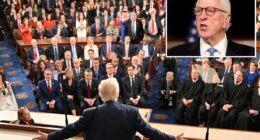Share this @internewscast.com
U.S. Supreme Court Associate Justice Sonia Sotomayor joined Knight Foundation President and CEO Maribel Pérez Wadsworth for a fireside chat in Miami on Tuesday, February 11, 2025 (AP Photo/Lynne Sladky).
As the U.S. Supreme Court geared up for their summer recess, Justice Sonia Sotomayor stretched the session by delivering a lengthy oral dissent, addressing a pivotal case that transformed the landscape of federal district court injunctions.
Sotomayor’s impassioned dissent underscores that the real focus of the case is the Trump administration’s intent to revoke birthright citizenship. She almost accuses the conservative majority of resurrecting the pro-slavery Dred Scott decision in a bid to appease the administration.
“Children born in the United States and subject to its laws are United States citizens,” the dissent begins. “That has been the legal rule since the founding, and it was the English rule well before then. This Court once attempted to repudiate it, holding in Dred Scott v. Sandford, that the children of enslaved black Americans were not citizens. To remedy that grievous error, the States passed in 1866 and Congress ratified in 1868 the Fourteenth Amendment’s Citizenship Clause, which enshrined birthright citizenship in the Constitution. There it has remained, accepted and respected by Congress, by the Executive, and by this Court. Until today.”
Love true crime? Sign up for our newsletter, The Law&Crime Docket, to get the latest real-life crime stories delivered right to your inbox.
In the case – and the concomitant opinion issued by the high court on Friday – the justices were not asked to consider the merits of President Donald Trump’s efforts against birthright citizenship. Rather, the government took aim at the constitutionality of nationwide injunctions – which have been issued by every district court reviewing the 45th and 47th president’s executive order.
The dissent accuses the Trump administration of lacking the wherewithal to try and defend the executive order on the merits.
“The Government does not ask for complete stays of the injunctions, as it ordinarily does before this Court,” the dissent goes on. “Why? The answer is obvious: To get such relief, the Government would have to show that the Order is likely constitutional, an impossible task in light of the Constitution’s text, history, this Court’s precedents, federal law, and Executive Branch practice. So the Government instead tries its hand at a different game. It asks this Court to hold that, no matter how illegal a law or policy, courts can never simply tell the Executive to stop enforcing it against anyone. Instead, the Government says, it should be able to apply the Citizenship Order (whose legality it does not defend) to everyone except the plaintiffs who filed this lawsuit.”
The justice repeatedly brings the merits to the fore of her dissent:
The majority ignores entirely whether the President’s Executive Order is constitutional, instead focusing only on the question whether federal courts have the equitable authority to issue universal injunctions. Yet the Order’s patent unlawfulness reveals the gravity of the majority’s error and underscores why equity supports universal injunctions as appropriate remedies in this kind of case. As every conceivable source of law confirms, birthright citizenship is the law of the land.
…
Few constitutional questions can be answered by resort to the text of the Constitution alone, but this is one. The Fourteenth Amendment guarantees birthright citizenship
Still, the court’s Republican-appointed members, accepting the Trump administration’s tactical approach, elided the merits entirely.
Sotomayor harshly upbraids her colleagues for playing ball.
“The gamesmanship in this request is apparent and the Government makes no attempt to hide it,” the dissent continues. “Yet, shamefully, this Court plays along. A majority of this Court decides that these applications, of all cases, provide the appropriate occasion to resolve the question of universal injunctions and end the centuries-old practice once and for all. In its rush to do so the Court disregards basic principles of equity as well as the long history of injunctive relief granted to nonparties.”
The majority opinion, penned by Justice Amy Coney Barrett, dispensed with the notion of nationwide injunctions, full stop.
“Nothing like a universal injunction was available at the founding, or for that matter, for more than a century thereafter,” the majority determined. “Thus, under the Judiciary Act, federal courts lack authority to issue them. “
Sotomayor says this landmark revision of the judicial landscape portends a dire future — and not just on issues of citizenship.
“No right is safe in the new legal regime the Court creates,” the dissent intones. “Today, the threat is to birthright citizenship. Tomorrow, a different administration may try to seize firearms from law-abiding citizens or prevent people of certain faiths from gathering to worship.”
But the dissent’s bleak outlook is not limited to issues alone. Rather, Sotomayor warns, something very striking and very bad has just happened to the entire edifice of law in the United States.
“The majority holds that, absent cumbersome class-action litigation, courts cannot completely enjoin even such plainly unlawful policies unless doing so is necessary to afford the formal parties complete relief,” the dissent continues. “That holding renders constitutional guarantees meaningful in name only for any individuals who are not parties to a lawsuit. Because I will not be complicit in so grave an attack on our system of law, I dissent.”
Sandwiched between broadside-style rhetoric, the dissent’s analysis largely fights on the terrain of the Judiciary Act and the concept of equity — remedies like injunctions and other ideas now associated with civil law. Sotomayor’s legal analysis, in opposition to Barrett’s, notes that universal injunctions were, in fact, available at the nation’s founding and long thereafter — specifically in the form of taxpayer lawsuits.
“[E]arly American courts understood taxpayer suits, in which even a ‘single taxpayer suing on his own account’ and not on behalf of others could secure a total injunction,” the dissent explains.
Notably, the majority leaves the door open for something not entirely unlike a nationwide injunction to persist for certain plaintiffs – so long as the courts frame such orders as “complete relief.” This term of art essentially means only the relief necessary to provide the plaintiffs – if they have standing to sue – a victory. In a concurrence, Justice Clarence Thomas describes the concept as “a ceiling” on what a court can provide. Such relief, the full court muses, may “only incidentally” benefit nonparties.
Sotomayor says this caveat will likely leave at least some of the injunctions in place — at least in terms of their relative effectiveness — even if the district courts, on remand, have to reconfigure the reasoning underlying their opinions.
“Even the majority’s view of the law cannot justify issuance of emergency relief to the Government in these cases, for the majority leaves open whether these particular injunctions may pass muster under its ruling,” the dissent goes on. “Here, respondents paired their respective requests for complete relief with the strongest story possible: Without such relief, an executive order that violates the Constitution, federal law, Supreme Court precedent, history, and over a century of Executive Branch practice would infringe upon their constitutional rights or cause them to incur significant financial and administrative costs.”
Constitutional issues beyond the 14th Amendment are also explored in depth by the principal dissent; Sotomayor views the court’s ruling as an affront to judicial review itself.
Again, the dissent, at length:
The Court’s decision is nothing less than an open invitation for the Government to bypass the Constitution. The Executive Branch can now enforce policies that flout settled law and violate countless individuals’ constitutional rights, and the federal courts will be hamstrung to stop its actions fully. Until the day that every affected person manages to become party to a lawsuit and secures for himself injunctive relief, the Government may act lawlessly indefinitely.
Not even a decision from this Court would necessarily bind the Government to stop, completely and permanently, its commission of unquestionably unconstitutional conduct. The majority interprets the Judiciary Act, which defines the equity jurisdiction for all federal courts, this Court included, as prohibiting the issuance of universal injunctions (unless necessary for complete relief ). What, besides equity, enables this Court to order the Government to cease completely the enforcement of illegal policies? The majority does not say.
Sotomayor concludes with another recitation of her warning – and eschewed the norm of “respectfully” disagreeing with the outcome.
“The rule of law is not a given in this Nation, nor any other,” the dissent ends. “It is a precept of our democracy that will endure only if those brave enough in every branch fight for its survival. Today, the Court abdicates its vital role in that effort. With the stroke of a pen, the President has made a ‘solemn mockery’ of our Constitution. Rather than stand firm, the Court gives way. Because such complicity should know no place in our system of law, I dissent.”
















